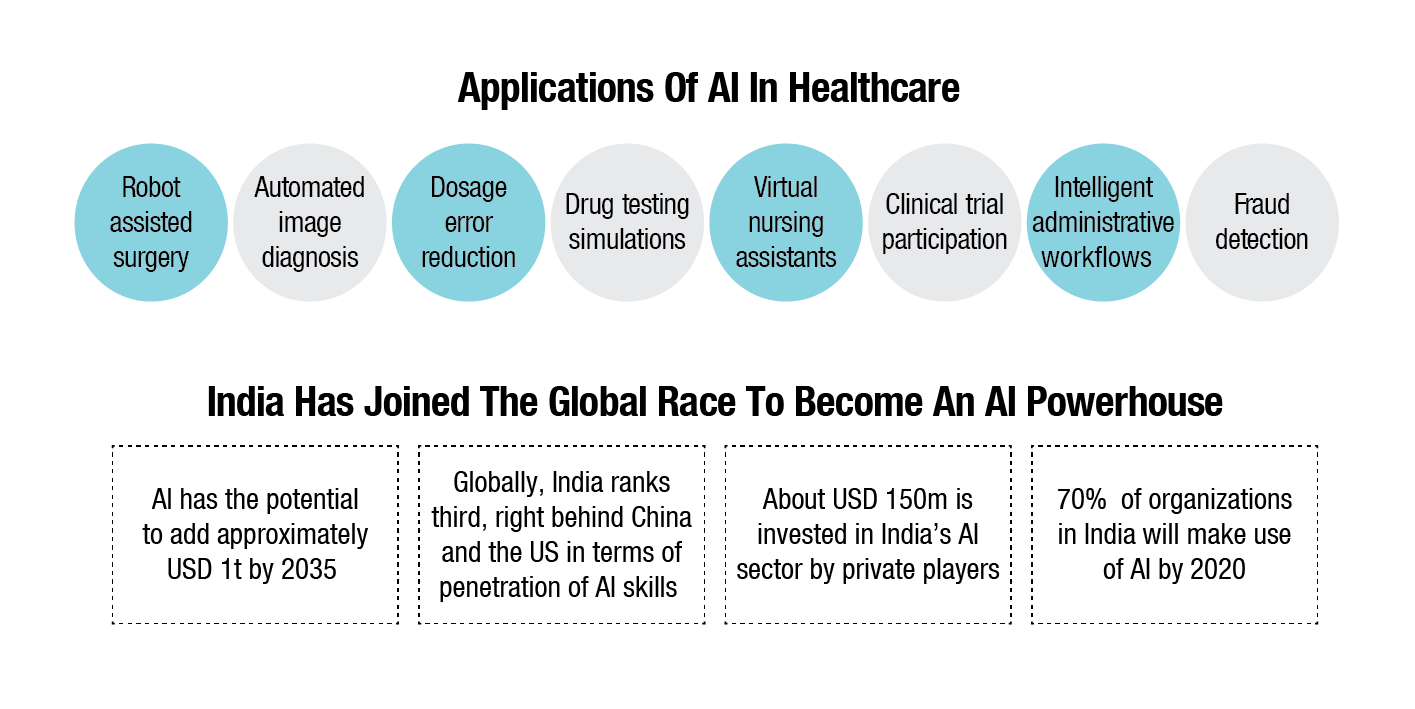AI
Artificial Intelligence for India’s transformation

The advancement of ML and AI-related technologies in 2019 and beyond will continue to take place. Leading technological companies are investing in research and development of AI, which will benefit the ecosystem in bringing AI closer to consumers.
Although artificial intelligence (AI) emerged in the 1960s, the hype exceeded results. The term artificial intelligence dates back to 1956 and belongs to a Stanford researcher, John McCarthy, who coined this term and defined its key mission as a sub-field of computer science. The concept of AI is based on the idea of building machines, capable of thinking, acting, and learning like humans.
AI in India
NITI Aayog came up with a National Strategy for Artificial Intelligence in India focusing on economic growth and social inclusion. It provides over 30 policy recommendations to invest in scientific research, encourages reskilling and training, accelerates the adoption of AI across the value chains, and promotes ethics, privacy, and security in AI. There have been a number of government-led initiatives towards promotion of AI with a purpose-led private partnership.
Below are a few of them:
Initiatives in 2017
- AI Task Force was formed by the Commerce and Industry Department, Government of India (GoI) that focuses on India’s economic transformation.
- One of the state governments of India announced Kaizala as a platform for its citizen-connect program to enable large-group communications and work management.
Initiatives in 2018
- NITI Aayog and ABB India signed a statement of intent (SoI) to incorporate the latest developments in robotics and AI;
- Invest India and the UAE Minister for AI signed a Memorandum of Understanding (MoU); and
- NITI Aayog, and Tata Institute of Fundamental Research (TIFR) initiated collaboration to set up ICTAI in Bengaluru, Karnataka.
Initiatives in 2019
- A new national program for the development of AI was announced in the Interim Budget 2019; and
- NITI Aayog launched AI 4 All Global Hackathon to promote awareness and develop solutions to address the infrastructure challenges, without compromising on the data privacy while training the AI algorithms.
Initiatives in SAP domain

NITI Aayog has partnered with SAP to support Atal Tinkering Labs on promotion of innovation in schools. The Ministry of Skill Development and Entrepreneurship has also partnered with SAP to provide exposure to youth on data sciences.
Sector Focus
AI in healthcare. According to the latest National Health Profile (NHP) 2018, India is among the countries with the least public health spending. The Indian government plans to live up to its promise of health assurance to all Indians with a health spending of just Rs. 3 per person per day that counts for 1.02 percent of the GDP.
AI in agriculture. The Government of India is introducing a new AGRI-UDAAN program to mentor start-ups and enable them to connect with potential investors. On the back of increased FDI and conducive government initiatives, the agriculture sector is increasingly looking at ways to leverage technology to improve crop yield.
Issues and challenges
- The issues and challenges can be classified under the following categories:
- Push toward AI and governing policies,
- Talent development and organizational resistance to change, and
- Data infrastructure and security.
India’s push toward AI. AI is fast emerging as the cornerstone for initiating and transforming policies for public welfare, economic impact, and regulations. Several countries over the last couple of years, such as the US, Canada, China, Singapore, and France have announced their national AI strategy documents. The EU has also committed to develop their AI policy. India too has been a part of this trend and has published two AI roadmaps – the Report of Task Force on Artificial Intelligence by the Ministry of Commerce and Industry, and the National Strategy for Artificial Intelligence by Niti Aayog.
Governing policies. For corporates venturing into AI, building a strong AI ethics policy is rigorous but imperative. Such policies are likely to have legal implications. For example, with companies using AI for recruitment, concerns have been raised about the unintended but possible disparate impact based on gender, race, or other protected classes of individuals.
Talent development. Educational institutions should provide opportunities for students to skill themselves to adapt to AI. Government should establish a network of alliances among academia, services industry, product industry, start-ups, and ministries. There should be a country-wide skilling program for those who are already in a relevant field and have a relatively short learning curve, so as to skill them to create the first wave of workers to address the shortage of talent.
Data infrastructure. In order to facilitate the development of AI’s ecosystem within India, there is a need to make available localized open data sets both government and private. As of now, only the government and established private sector corporates have the ability to acquire data and build datasets. However, gaining access to this data comes with concerns, such as privacy, accuracy, and completeness.
Security. AI is evolving as a collaborative solution for a distributed group of intelligent agents. AI can run, train, and even make decisions on local devices in decentralized networks like blockchain. However, it also brings along certain risks, such as increased exposure to cyber security risks to multiple integrated systems and diminished security to protect sensitive data.
Organizational resistance to change. More than half of the repetitive/predictive job roles are at risk of AI automation. Despite these fears and concerns raised around lost jobs, every technological shift has ended up creating more jobs than destroying them.
AI’s potential
Overview of global artificial intelligence market. AI can be a key catalyst in driving business efficiency and growth. The transformative nature of the technology has been widely talked about; its full potential is yet to be seen. Research by Gartner predicts that 85 percent of CIOs will be piloting AI programs through a combination of buy, build, and outsource efforts by 2020 in order to develop a business case for AI and step up their game. Gartner also expects that at least 40 percent of new application development projects will have AI co-developers on their teams by 2022.
Global cognitive and AI systems are poised to grow at 37.3 percent CAGR from 2017–2022 to USD 77.6 billion in 2022. Globally, companies are investing in cutting-edge AI trends across sectors. Investment funds, venture capital (VC) firms and corporate investors across the globe are rapidly increasing equity investments in AI start-ups across sectors, indicating a growing global interest in AI technologies and their commercial applications.
AI is shaping the workforce of the future. A new report by the World Economic Forum titled The Future of Jobs 2018 stated that the growth of AI is expected to create 133 million new roles, but may lead to displacement of 75 million jobs by 2022, thereby assuring that AI could create a net of 58 million new jobs in the next few years. EY predicts that by 2022, around 46 percent of the workforce will be engaged in entirely new jobs that are non-existent today. AI skills are among the fastest-growing skills on LinkedIn, witnessing a 190 percent increase from 2015 to 2017.
India has joined the global race to become an AI powerhouse. AI has the potential to add approximately USD 1 trillion by 2035. Globally, India ranks third, right behind China and the US, in terms of penetration of AI skills. About USD 150 million is invested in India’s AI sector by private players; 70 percent of organizations in India will make use of AI by 2020. Companies in India are investing heavily in the AI space. Rising investments and deals in automation, AI, Machine Learning, and Big Data are flourishing the start-up landscape in the country. Over half (58 percent) of the companies that are using AI in India work at scale, beyond pilot and test projects – one of the highest in the world. Investment in AI start-ups in India has grown to USD 73 million in 2017 from USD 44 million in 2016. India had the third largest number of AI start-ups among G-20 nations in 2016, growing at a CAGR of 86 percent since 2011. Currently, about 400 start-ups are working on AI and Machine Learning domains.
Some of the top AI investments of the recent times include SigTuple (USD 19 million), Active Intelligence (USD 8 million), Observe (USD 8 million), Uniphore (USD 7 million), CreditVidya (USD 5 million) and Edge Network (USD 5 million). Investors that are leading AI funding in India are Accel Partners, IDG Ventures, Sequoia, Matrix Partners, Axilor, and India Angel Network, among others.
During 2018, there was a dramatic rise in the platforms, tools, and applications based on Machine Learning and AI. These technologies not only impacted software and the internet industry but also increased the use of AI in public and private sectors across the industries. The advancement of ML and AI-related technologies in 2019 and beyond will continue to take place. Leading technological companies are investing in research and development of AI, which will benefit the ecosystem in bringing AI closer to consumers.
Based on an Assocham-EY report, Artificial Intelligence for India’s Transformation
 “While India is expected to make great progress in AI in the next five years, issues such as regulatory policies, AI talent development, data infrastructure, domain expertise to provide sectoral knowledge to AI, and data privacy and security need to be addressed effectively for rapid adoption and absorption of AI.”
“While India is expected to make great progress in AI in the next five years, issues such as regulatory policies, AI talent development, data infrastructure, domain expertise to provide sectoral knowledge to AI, and data privacy and security need to be addressed effectively for rapid adoption and absorption of AI.”
Prakash Jayaram
Partner, Digital Government Advisory, EY
 “With increasing digitization, the whole world is moving towards AI-enabled systems and technologies. India, being one of the software developers and exporting countries, is forging ahead implementing AI too. The government has identified five focus areas where AI development could be used: healthcare, agriculture, education, urban-/smart-city, infrastructure, and transportation and mobility”.
“With increasing digitization, the whole world is moving towards AI-enabled systems and technologies. India, being one of the software developers and exporting countries, is forging ahead implementing AI too. The government has identified five focus areas where AI development could be used: healthcare, agriculture, education, urban-/smart-city, infrastructure, and transportation and mobility”.
Balkrishan Goenka
President, Assocham













You must be logged in to post a comment Login